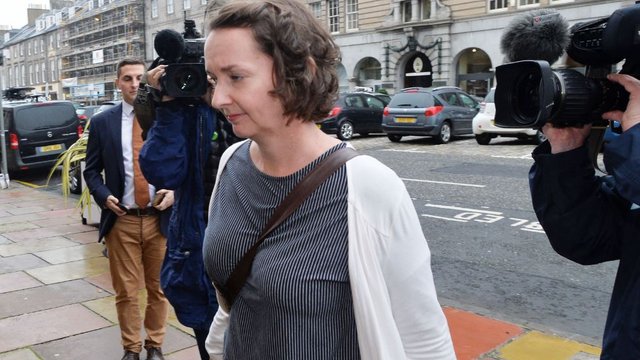Cafferkey Cleared Of Misconduct
14 September 2016, 14:06 | Updated: 14 September 2016, 15:16

Ebola nurse Pauline Cafferkey will be allowed to continue to practise after being cleared of misconduct over her return to the UK with the virus.
An independent panel at the Nursing and Midwifery Council (NMC) in Edinburgh found three charges against Pauline Cafferkey were not proven and therefore her fitness to practise was ''not impaired''.
The Scottish medical worker, 40, became infected with Ebola while working in Sierra Leone in 2014.
The NMC had alleged Ms Cafferkey allowed an incorrect temperature to be recorded during the screening process at Heathrow Airport towards the end of December that year and that she left a screening area without reporting her true temperature.
In reaching the decision, chairman Timothy Cole said ``compelling and clear medical evidence'' about Ms Cafferkey's state of mind and ability to reason and make objective decisions at the time was central to the panel's deliberations.
Speaking outside the hearing, Ms Cafferkey's lawyer said she was ''relieved the process is at an end'' and that Ms Cafferkey would never knowingly place anyone in danger.
Solicitor Joyce Cullen said: ''She willingly put her life at risk to travel to Sierra Leone to work as a volunteer helping to treat people suffering from Ebola.
''She and hundreds of other volunteers played a vital role in saving lives, helping to curb the epidemic in extremely challenging circumstances.
''As the panel heard, when Pauline and her fellow volunteers arrived at Heathrow they were faced with chaotic scenes.''`Public Health England were unprepared for the volume of people returning from countries affected by Ebola.
''There were also serious failures in communication amongst the Public Health England staff.
''It is perhaps ironic given the criticisms made of Public Health England's processes it was their complaint which led to the NMC investigation and these proceedings being initiated against Pauline. No doubt lessons have been learned.
''Throughout her career Pauline has been motivated by a genuine desire to help other people even if this meant putting her own life at risk.
''She would never have knowingly put anyone in danger. Pauline was lucky to survive.''
She said the disciplinary process had been ``distressful and upsetting'' for her client.
''She is delighted that the panel has made the decision she has no case to answer and is now able to continue her nursing career in Scotland.''
Ms Cafferkey was present at the session to hear the decision of the panel and appeared to smile as she left the hearing room.
On the taking of paracetamol at the airport by Ms Cafferkey, the panel said it was satisfied she did not ''set out to mislead any health professional or withhold information''.
''The panel is not satisfied that your actions can be characterised as misconduct,'' Mr Cole said on that aspect.
Turning to the charges of allowing an incorrect temperature to be recorded, Mr Cole pointed to the nurse's ''medically-impaired state'' at the time.
It was ''not disputed'' she was ''experiencing the early effects of a significant viral load of Ebola'', he told the hearing.
He said her health was ''going rapidly downhill at that time'' and the events ''occurred in circumstances characterised as disorganised and chaotic''.
Mr Cole went on: ''The panel is of the view that in your diminished mental state you were swept along by events and it was satisfied that in order to make a finding of misconduct it would be necessary to find a degree of participation.''
He went on: ''The panel is not satisfied that your actions could properly be characterised as misconduct.''
The chairman then turned to the charge of leaving the screening area without reporting her true temperature to staff.
He said that, as a professional with knowledge of the importance of recording temperature, it was ``inconceivable'' she would ``leave the safe environment of the PHE screening area but for the fact that you were already seriously ill''.
''The panel therefore concludes that your judgement had already been significantly impaired involuntarily and therefore could not properly be characterised as misconduct,'' Mr Cole said.
He added the fact she was unable to accept she was ill when she returned to Glasgow pointed to her''`diminished reasoning'' caused by the virus.
''For all the reasons outlined, the panel has concluded that your actions ... did not amount to misconduct.''
The question of whether her fitness to practise was impaired did not therefore arise.
Concluding the hearing, Mr Cole wished Ms Cafferkey ''a full recovery and every success for your future''.







